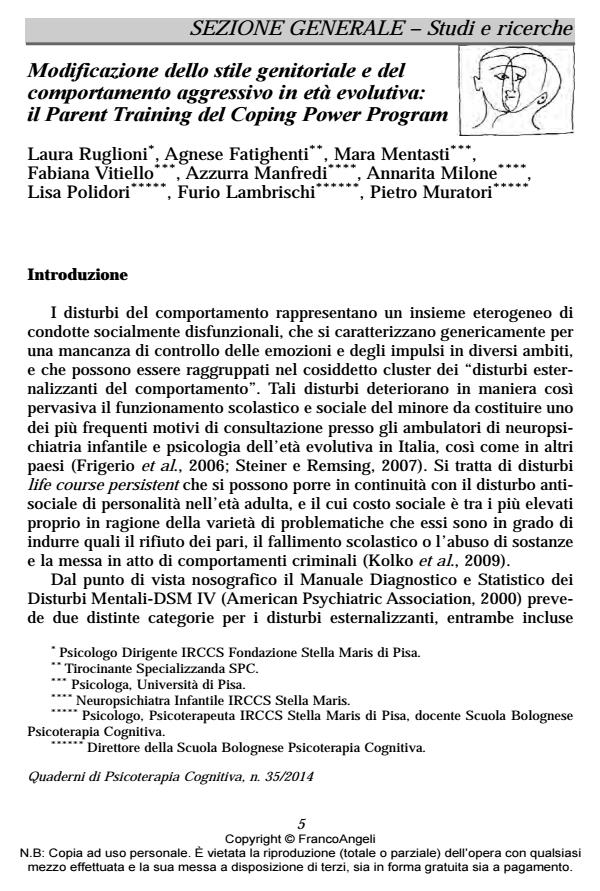Modificazione dello stile genitoriale e del comportamento aggressivo in età evolutiva: il Parent Training del Coping Power Program
Titolo Rivista QUADERNI DI PSICOTERAPIA COGNITIVA
Autori/Curatori Laura Ruglioni, Agnese Fatighenti, Mara Mentasti, Fabiana Vitiello, Azzurra Manfredi, Annarita Milone, Elisa Polidori, Furio Lambrischi, Pietro Muratori
Anno di pubblicazione 2014 Fascicolo 2014/35
Lingua Italiano Numero pagine 17 P. 5-21 Dimensione file 80 KB
DOI 10.3280/QPC2014-035001
Il DOI è il codice a barre della proprietà intellettuale: per saperne di più
clicca qui
Qui sotto puoi vedere in anteprima la prima pagina di questo articolo.
Se questo articolo ti interessa, lo puoi acquistare (e scaricare in formato pdf) seguendo le facili indicazioni per acquistare il download credit. Acquista Download Credits per scaricare questo Articolo in formato PDF

FrancoAngeli è membro della Publishers International Linking Association, Inc (PILA), associazione indipendente e non profit per facilitare (attraverso i servizi tecnologici implementati da CrossRef.org) l’accesso degli studiosi ai contenuti digitali nelle pubblicazioni professionali e scientifiche.
La letteratura, attraverso prove evidence-based, sostiene che gli interventi terapeutici per i minori con DCD che prevedono il coinvolgimento dei genitori sono risultati generalmente più efficaci di quelli in cui è solo il bambino ad essere coinvolto. Lo scopo principale di questo studio è di testare l’efficacia della componente di Parent Training contenuta nel Coping Power Program, intervento di matrice cognitivo-comportamentale, focalizzato su obiettivi specifici e strutturato in setting di gruppo, rispetto a un modello d’intervento di matrice cognitivo comportamentale strutturato in base ai bisogni del singolo caso e in setting individuale o di coppia, denominato "Beyond the Clouds". Lo scopo parallelo è quello di valutare il potere predittivo che alcune variabili del parenting possono avere sul cambiamento del comportamento aggressivo dei figli. In particolare si ipotizza che uno scarso cambiamento della disciplina inconsistente e disciplina dura da parte dei genitori nel corso del trattamento predica un minore cambiamento del comportamento aggressivo nei figli. In particolar modo si osservano gli effetti maggiori del CPP sulle variabili parenting positivo e disciplina incoerente. Inoltre si è osservato che solo la disciplina incoerente influenza il miglioramento del comportamento aggressivo del figlio.
Parole chiave:Disturbi del comportamento dirompente, parent training, stili di parenting.
Laura Ruglioni, Agnese Fatighenti, Mara Mentasti, Fabiana Vitiello, Azzurra Manfredi, Annarita Milone, Elisa Polidori, Furio Lambrischi, Pietro Muratori, Modificazione dello stile genitoriale e del comportamento aggressivo in età evolutiva: il Parent Training del Coping Power Program in "QUADERNI DI PSICOTERAPIA COGNITIVA" 35/2014, pp 5-21, DOI: 10.3280/QPC2014-035001